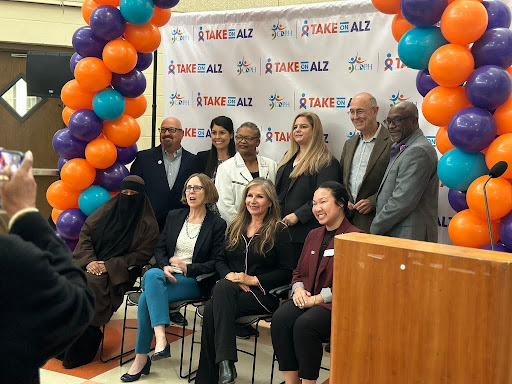
By Emily Kim Jenkins, Contributing Writer
The George Stevens Senior Center was buzzing. The coffee was flowing and Curtis Mayfield’s undeniable toe-tapping melodies were playing. From the laughter around the room, it may not seem like an event covering topics such as Alzheimer’s disease and racial disparity, but underscoring the entire morning was a sense of hope.
On June 20, Take on Alzheimer’s, the branch of the California Department of Public Health overseeing Alzheimer’s care and research, organized “Take on Alzheimer’s in San Diego County”, bringing together county officials, research organizations and advocates for caregivers. National City Mayor Ron Morrison started the event with an official proclamation, declaring June Brain Health Awareness Month in the city. Dr. Wilma Wooten, retiring the next day as San Diego County’s Public Health Officer after 23 years, shared about the disproportionate impact Alzheimer’s has on minority communities.
”Experts… are keenly aware that women in communities of color are at a disproportionately higher risk of developing Alzheimer’s disease,” Dr. Wooten said. “Tragically, fear and stigma often prevented many from seeking information, assistance, or a diagnosis until those diseases progressed.”
Research shows that Black and Hispanic Americans are more likely to be afflicted with Alzheimer’s or dementia, and Dr. Wooten added that by 2040, the amount of Black and Latino Californians with Alzheimer’s is expected to nearly triple.
“If we’re not reaching out to the population in a culturally competent manner, [Alzheimer’s support] services are going to sit on the shelf and people are not going to have access to them,” Roberto Velasquez, CEO of the Southern Caregiver Resource Center said.
Dr. Ron Lewis of the Alzheimer’s Association (San Diego/Imperial Valley chapter) echoed Velasquez’s thoughts.
”The key thing that we need as caregivers for our loved ones and those dealing with dementia is empowerment. Knowledge is power,” he said. “We’re caring for our mother, our father, our aunts and our grandparents. I think it’s essential to be able to empower our communities by having events like this.”
Besides education and access to services, Faiza Warsame of the United Women of East Africa Support Team (UWEAST), noted that stigma is a significant issue.
”Nobody talks about Alzheimer’s in our community,” she said, adding that this affects the ability to request services that work for East African culture. “A lot of [people] in the East African Community… like to have our parents and our elders stay with us as they get older. So it’s really hard to find new resources for them.”
UWEAST is at the forefront of medical support locally for East African families, providing free interpretation services to help support culturally competent healthcare for the community.
A common thread between many in the room was personal experience with loving someone in cognitive decline. The room became solemn as Josie Flores-Clark, president of the National Latina Business Women’s Association and the San Diego Hispanic Chamber of Commerce, shared a misty-eyed story of learning to cherish caring for her mother for eleven years.
Dr. Lewis’ experience mirrored Flores-Clark’s, as he described the nearly twelve year journey of caring for his mother from a long distance, and with a gentle laugh, recalled her insistence that she stay in her home in Georgia rather than come live with him in San Diego.
Lena Huang of the Alzheimer’s Association San Diego/Imperial Valley chapter, smiled brightly when sharing about local resources.
The Alzheimer’s Association provides free education about the disease itself online and in person, she noted, as well as caregiver support groups. An all-hours helpline, 1-800-272-3900, is monitored by clinicians to offer guidance to patients and caregivers.
“What’s good for the body is good for the mind,” Kristen Smith from San Diego County’s Aging and Independence Services said, emphasizing the importance of exercise in preventing brain disease. She also added that hearing loss can have a surprising link to memory care.
“When we lose our hearing, we tend to disengage and not talk as much to others and we get more isolated,” she said. Social engagement, she says, is important. “We need to interact with people to keep our brain working well.”
Cognitive impairment, Smith said, can happen as one ages and may not be a long-term condition. Something as simple as an untreated urinary tract infection can cause temporary issues, so check ups are important to stay on top of brain health.
“Most people wait until there’s a crisis, or until things are out of control,” Velasquez added. “It’s really important if you do see some of the warning signs, start reaching out to some of the resources right away.”
The morning was filled with conversation from caregiver advocates and neuroscience researchers, an optimistic showing that San Diego County is, indeed, taking on Alzheimer’s.
If you want to learn more, help is a Google search away. Several local partners who participated in last Thursday’s event in the fight against Alzheimers included: Alzheimer’s Association (alz.org), Southern Caregiver Research Center (caregivercenter.org), Jewish Family Services of San Diego (jfssd.org), Alzheimer’s San Diego (alzsd.org), United Women of East Africa (uweast.org), and the UCSD Shiley-Marcos Alzheimer’s Disease Research Center.


